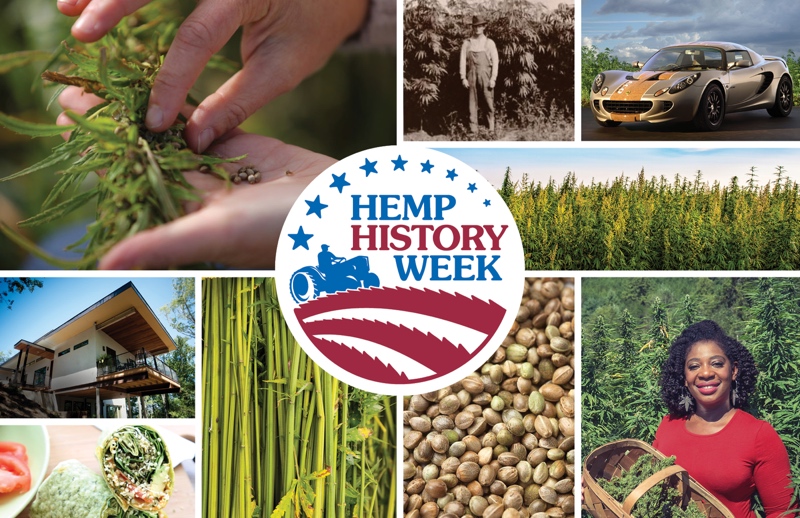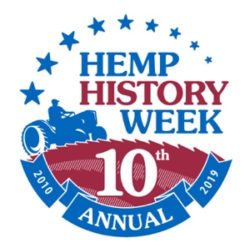High Hopes for Hemp
On December 20, 2018, the United States Congress passed the Farm Bill, finally legalizing the commercial production of hemp. With the stroke of a pen, nearly 50 years of prohibition of growing one of the most useful plants in the United States was finally put to rest. You may be wondering what hemp is and why all the fuss?
Hemp is the non-psychoactive variety of the Cannabis sativa plant grown for a wide variety of applications. Hemp is not marijuana. When ingested, it won’t get you high. Although hemp is historically associated with making rope and paper, this 21st-century wonder product now is used in more than 25,000 products worldwide.

Hemp’s Many Uses
Among hemp’s personal, environmental and industrial uses:
Personal:
- If you’re not eating hemp seeds, give them a try. One serving of hemp seeds (3 tablespoons) packs 11 grams of protein, including nine amino acids and omega-3 and omega-6 fatty acids. Hemp has no gluten and no known allergens.
- CBD, the popular non-psychoactive supplement that supports physical and emotional challenges, hails from the hemp plant.
- Clothing made from hemp is stronger, more comfortable and lasts longer than clothing made from other fibers. Try on a t-shirt made with hemp and feel the softness.
Environmental:
- Plastic made from hemp is biodegradable and can help reduce plastic waste in landfills.
- Hemp can be converted to biofuel. Commonly known as ‘hempoline,’ it replaces petroleum-based fuels. But don’t be too impressed. Back in the 1940s, Henry Ford’s first Model T ran on fuel made from hemp.
- Hemp can even clean up tainted soil and water and stamp out pesky weeds.
Industrial:
- Car parts (yes, cars!) are made from hemp. Any car part that’s made of plastic can be made from hemp.
- Hemp makes strong, durable construction materials. For example, cement made from hemp uses minerals and core fibers and is more resistant to bad weather.
Boon for the Economy
The hemp industry’s economic impact is likely to skyrocket with the passing of the 2018 Farm Bill. American farmers, long buffeted by trade wars, industry downturns and climate change, stand to benefit immensely. To illustrate, in 2018, hemp farming acreage increased to 70,000 acres from 23,000 in 2017. That number is expected to expand even more this year. The hemp industry will benefit the U.S. economy in other ways. For instance, the rapidly growing CBD industry is expected to hit $20 billion in 2022. At the same time, dependence on foreign countries like China and Canada for hemp imports is predicted to continue its downhill fall as more and more U.S. farmers jump on the hemp farming bandwagon.
Hemp’s Circuitous History
If you think hemp cultivation is a 20th-century discovery, you’ll be surprised to learn it dates back thousands of years. In fact, archaeologists found evidence of hemp cloth in Mesopotamia in 8,000 BC. Hemp has been grown in our country since the first European settlers arrived here during the 1600s, and was a vital part of life in our country’s early history. Also:
- The Declaration of Independence was drafted on paper made of hemp.
- George Washington, Andrew Jackson and John Adams all grew hemp and advocated for its commercial production.
- Hemp was such an important staple during the 1800s, towns such as Hempfield and Hempstead were named after the crop.
Hemp underwent two prohibition eras, once during the 1930s when hemp was classified as “marijuana” and made illegal, and again, in 1970, when industrial hemp was classified as marijuana under the Controlled Substance Act. Between those times, hemp was widely used during WWII.
Celebrate Hemp History Week at Martindale’s
 In its tenth year, Hemp History Week, June 3 — 9, 2019, is a national grassroots campaign to continue strong support for industrial hemp farming in the United States. Thanks to these grassroots efforts, hemp farming is now legal for cultivation, research or pilot programs in all 50 states. The door is finally re-opened to cultivate this amazing plant and use it to get healthy, help the environment and for industry.
In its tenth year, Hemp History Week, June 3 — 9, 2019, is a national grassroots campaign to continue strong support for industrial hemp farming in the United States. Thanks to these grassroots efforts, hemp farming is now legal for cultivation, research or pilot programs in all 50 states. The door is finally re-opened to cultivate this amazing plant and use it to get healthy, help the environment and for industry.
Martindale’s supports our hemp farmers and offers many products made from hemp. Come to the store and celebrate Hemp History Week with us. Check out our cool display of food and bath and beauty items made from hemp! In addition to hemp seeds and CBD products, we also sell wellness products made from hemp.
Hemp History Week Sponsors
Here’s a big shout-out to the generous supporters of Hemp History Week. Martindale’s carries products of these sponsors.
- Dr. Bronner’s All-One®
- Manitoba Harvest®
- PlusCBD™ Oil
- Nutiva®
